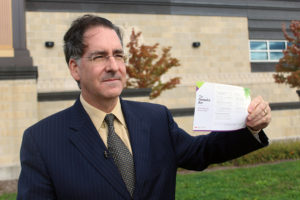Legalization of pot may cause border issues

Brian Masse poses with the pamphlet given out by the government of Canada regarding the Cannabis Act
By Cassidy McNea
A local member of parliament is concerned about how the legalization of cannabis will affect border traffic.
Each year more than six million people cross the Ambassador Bridge. With legalization coming into effect on Oct. 17 MP Brian Masse said it is important to know the laws and legalities when crossing the border.
According to a pamphlet given out by the government of Canada, it is illegal to take cannabis across the Canadian border. This applies to all countries, whether cannabis is legal there or not.
“I am encouraging people to have those awkward conversations with your family members if you have a job over in the United States, if you have dependency of your daily activities there or family,” said Masse. “Make sure it is not in cars, not in your materials you are crossing with. Make sure you are well versed on what is you want to say when crossing the border.”
Masse said he does not suggest lying as repercussions will be significant, but instead to have your house in order.
In a CBC interview, Windsor Mayor Drew Dilkens said what happens at the border is a concern and there may be delays when crossing.
“I think what most people don’t understand is even though we are such an integrated and tight economy here with our friends over in Detroit and the state of Michigan, that little piece of land is considered federal land which means federal law applies,” said Dilkens. “When you enter the United States, marijuana in the U.S. federal code is still considered a schedule one drug which is equivalent to cocaine, heroin and many other drugs.”
Masse said there has been multiple indications this will be a problem and Canadians may be detained and sent back, as well as being barred from the United States.
In 1998 Canadian snowboarder Ross Rebagliati said he smoked pot in the past while being interviewed by Jay Leno on The Tonight Show and was banned from entering the U.S. He had no previous criminal record.
Kristin Douglas, an executive director for Ethiopiaid Canada, does not smoke weed but said she was pressed with questions while crossing the border to visit her mother. The border agent asked her why her trunk smelled like weed and asked whether she smoked.
“When I posted my situation on Facebook there were a couple people who had a very similar line of questioning given to them and they don’t smoke marijuana either,” said Douglas. “I think it is something new that they’re trying because weed is going to be legalized soon to try and get people to admit to smoking it or admit to having ever smoked it.”
Douglas said it seemed as if the customs officer was trying to pressure her to cave and said it did not seem like a serious inquiry because if her trunk had smelled like cannabis she would have been detained.
Masse said there has been little information from the federal government regarding travelers coming from the U.S. but the concerns are still there.
“We live and breathe the border here, like it is a normal thing, but that is not the normal experience for most Canadians across the country,” said Masse.
The government of Canada plans to implement several traveller awareness plans some of which include installing signs at the Canadian ports of entry, including leaflets with new passports and asking travellers declare cannabis at the border.
According to U.S. Customs and Border Protection, more than 280,000 marijuana drug seizures have occured at the border so far in 2018.
“Right now there is a lot of uncertainty it has never been cleared up and it will be that way for the foreseeable future,” said Masse. “You control what you can in your immediate zone.”


